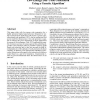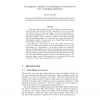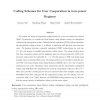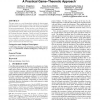245 search results - page 9 / 49 » A low power scheduler using game theory |
115
click to vote
TSP
2008
15 years 1 months ago
2008
In this two-part paper, we propose a decentralized strategy, based on a game-theoretic formulation, to find out the optimal precoding/multiplexing matrices for a multipoint-to-mult...
118
click to vote
ICCD
2001
IEEE
15 years 10 months ago
2001
IEEE
This paper deals with low-energy code generation for a highly optimized digital signal processor designed for mobile communication applications. We present a genetic algorithm bas...
103
click to vote
IJHPCA
2006
15 years 1 months ago
2006
Today, large scale parallel systems are available at relatively low cost. Many powerful such systems have been installed all over the world and the number of users is always incre...
TSP
2008
15 years 1 months ago
2008
We consider the design of cooperation coding schemes for a two-user multi-access channel (MAC). In particular, we consider two block Markov coding schemes, namely, the multiplexed...
124
click to vote
ATAL
2009
Springer
15 years 8 months ago
2009
Springer
This paper reports on a novel decentralised technique for planning agent schedules in dynamic task allocation problems. Specifically, we use a Markov game formulation of these pr...




